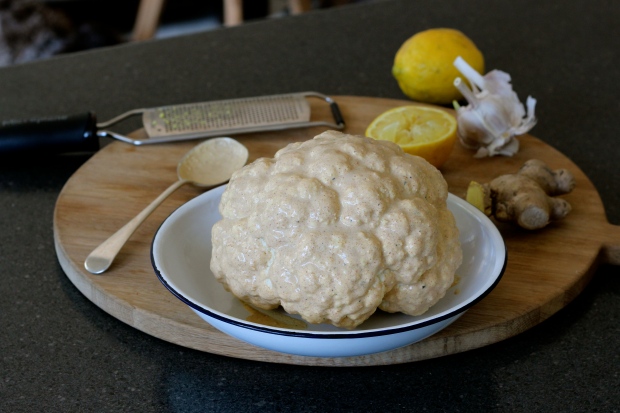Spicy Yoghurt Marinated Roast Cauliflower.
I have become a little obsessed with cauliflower over the last couple of years as a fantastic alternative to starchy root vegetables. My two favourite recipes are cauliflower rice (you can find my broccoli/cauliflower rice recipe here) and the most delicious cauliflower puree of all time (yep, I love it that much) which resides in my eBook, A Nourishing Kitchen.
Here’s a few other reasons why you should be loving cauliflower too:
Antioxidant
An excellent source of vitamin C and manganese (as well as a broad range of phytonutrients), cauliflower provides two core conventional antioxidants, which help lower the risk of oxidative stress on our cells.
As per this study published in the American Journal of Clinical Nutrition, Chronic oxidative stress, meaning the chronic presence over overly reactive oxygen-containing molecules and the subsequent damage to our cells by these molecules—is a risk factor for development of most cancer types. By providing us with such a great array of antioxidant nutrients, cauliflower helps lower our cancer risk by helping us avoid chronic and unwanted oxidative stress.
Anti-inflammation
As an excellent source of vitamin K, cauliflower provides us with one of the key anti-inflammatory nutrients. Vitamin K acts as a direct regulator of our inflammatory response. Like chronic oxidative stress, chronic unwanted inflammation can significantly increase our risk of cancers and other diseases (especially cardiovascular diseases).
Cardiovascular
By virtue of having antioxidant and anti-inflammatory properties, cauliflower consumption is protective against cardiovascular and cerebrovascular diseases. This is particularly noticed where there is inflammation of blood vessels/decreased blood flow to organs, such as in artheroslecerosis. By decreasing chronic inflammation, cauliflower is able to maintain the patency of the blood vessels and keeps excellent blood flow to essential organs of the body.
Digestive
The fiber content of cauliflower, nearly 12 grams in every 100 calories, makes this cruciferous vegetable a great choice for digestive system support. (steadyhealth.com)
Nutritional
Cauliflower also contains vitamins B1 (thiamine), B2 (riboflavin), B3 (niacin), B5 (pantothenic acid), B6 (pyridoxine) and B9 (folic acid). It serves as a good source of proteins, phosphorus and potassium.
Spicy Yoghurt Marinated Roast Cauliflower.
This recipe was inspired by the talented Sarah Britton from the My New Roots website. Not only is it super easy to prepare but it looks absolutely stunning on the table! Personally I feel it will be a welcome addition to the Christmas table this year. Feel free to play around with the spices. Here’s a handy tip: if you are short on time, simply grab a jar of tandoori paste, or any curry paste you choose, and stir a heaped tablespoon in with the yoghurt. A marinade ready to go in two minutes and really very tasty indeed.
1 full cauliflower, leaves removed, stem chopped down to base (so that it sits flat).
Marinade:
1/2 cup greek (or other thick) yoghurt
1 tablespoon garam masala
1 tablespoon lemon juice
2 garlic cloves, minced
1 heaped teaspoon minced fresh ginger
1/2 teaspoon turmeric powder
Good pinch of sea salt
Preheat your oven to 400F/200C and line a baking tray with baking paper. In a bowl, mix together all the marinade ingredients then fully coat the entire cauliflower, including underneath. Pop into the oven for 45-60 minutes, depending on the size of your cauliflower. Drizzle with lots of lemon juice to serve.










Roasted cauliflower is the best! But I’ve never baked it whole like in the photo, I love how you can slice into it like if it were cake!
this looks delicious
Reblogged this on Recipe Reblog.